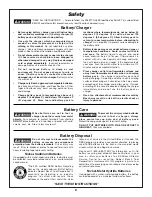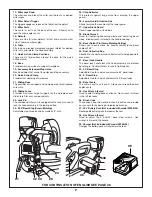
4
Safety
“READ ALL INSTRUCTIONS” — Failure to follow the SAFETY RULES identified by BULLET (•) symbol listed
BELOW and other safety precautions, may result in serious personal injury.
•
Always use a clamp or a fixture designed to properly
support round material such as dowel rods, or
tubing.
Rods have a tendency to roll while being cut,
causing the blade to “bite” and pull the work with your
hand into the blade.
•
When cutting irregularly shaped workpieces, plan
your work so it will not slip and pinch the blade and
be torn from your hand.
A piece of molding, for
example, must lie flat or be held by a fixture or jig that will
not let it twist, rock or slip while being cut.
•
Let the blade reach full speed before contacting the
workpiece.
This will help avoid thrown workpieces.
•
If the workpiece or blade becomes jammed or
bogged down, turn miter saw “OFF” by releasing
switch. Wait for all moving parts to stop and remove
battery pack from tool, then work to free the jammed
material.
Continued sawing with jammed workpiece
could cause loss of control or damage to compound
miter saw.
•
Braking action of the saw causes the saw head to
jerk downward. Be ready for this reaction
when
making an incomplete cut or when releasing the switch
before the head is completely in the down position.
•
After finishing the cut, release the switch, hold the
saw arm down and wait for blade to stop before
removing work or cutoff piece. If blade does not stop
within five (5) seconds, remove battery pack from
tool and follow the instructions in the
Troubleshooting section.
REACHING WITH YOUR
HAND UNDER A COASTING BLADE IS DANGEROUS!
•
Do not allow familiarity gained from frequent use of
your miter saw to become commonplace.
Always
remember that a careless fraction of a second is
sufficient to inflict severe injury.
•
THINK SAFETY! SAFETY IS A COMBINATION OF
OPERATOR’S COMMON SENSE, KNOWLEDGE OF
THE SAFETY AND OPERATING INSTRUCTIONS AND
ALERTNESS AT ALL TIMES WHEN THE MITER SAW IS
BEING USED.
Some dust created by power sanding,
sawing, grinding, drilling, and other
construction activities contains chemicals known to
cause cancer, birth defects or other reproductive harm.
Some examples of these chemicals are:
• Lead from lead-based paints,
• Crystalline silica from bricks and cement and other
masonry products, and
• Arsenic and chromium from chemically treated
lumber.
Your risk from these exposures varies, depending on how
often you do this type of work. To reduce your exposure to
these chemicals: work in a well ventilated area, and work
with approved safety equipment, such as those dust masks
that are specially designed to filter out microscopic
particles.
•
There are additional safety instructions for particular
operations of the saw in the operating section. Read
the rest of the manual for safe operation.
“SAVE THESE INSTRUCTIONS”
WARNING
!
WARNING
!
Summary of Contents for 3924-24
Page 86: ...86 Notes Remarques ...
Page 87: ...87 Notas ...





































